新牛津译林版八年级英语下册Unit 1 Past and Present 第一课时导学案
牛津译林八年级英语下Unit 1 Past and present Grammar(共23)
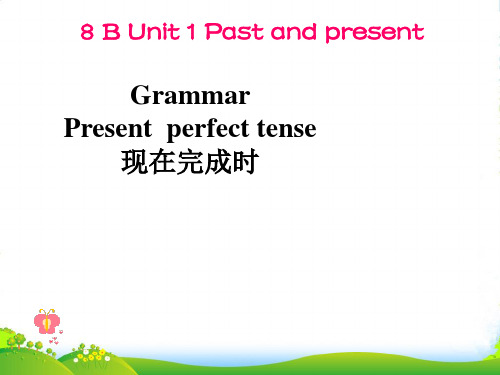
5. The Greens _h_a_s_l_iv_e_d__(live) in China since they _m__o_v_e_d_(move) here in 2003.
Since 一段时间+ago, since 9 years ago, since 3 days ago…, +点时间 一般过去时态的时间状语从句:since you came,
since he moved here, since I was born…
1.Eddie has lived with Millie for 4 years.
一、现在完成时的含义
(1)表示延续:表示动作或者状态从过去开始并延续到 现在,可能还将延续。此时常和for,since连用。
for: + 一段时间 for a year, for two weeks, for three years... 过去的某一时刻, since last week, since 2008…
1.I _h_a_v_e_s_e_e_n_(see) the 3D film Avatar. It’s amazing! I __s_a_w_____(see) it one month ago.
2.--Is your grandfather still alive? --No, he _h_a_s__already __d_ie_d__(die). --When __d_id____he ___d_ie___(die)? --He __d_ie_d___last year(die).
牛津译林版英语八下 Unit 1 Past and present

八下Unit 1 Past and presentWelcome to the unit1. 一个小时前__________________________________________________2. 过去经常和我分享食物__________________________________________________3. 过去对我很好__________________________________________________4. 做一个关于近年来北京所发生的变化的历史课题______________________________________________________________________________5. 不同时期的交通__________________________________________________6. 不同的交通形式__________________________________________________7. 逛这个城市__________________________________________________8. 去其他城市__________________________________________________9. 等下一班车要花好长时间。
__________________________________________________10. 乘公交车去上学既方便又快捷。
_______________________________________________ Reading11. 写阳光镇的变化__________________________________________________12. 采访他以获得一些信息__________________________________________________13. 很了解阳光镇__________________________________________________14. 你对阳光镇有多了解?__________________________________________________15. 你了解阳光镇什么呢?__________________________________________________16. 自从出生我就一直住在这里。
牛津译林版八年级下册Unit 1 Past and Present课件1
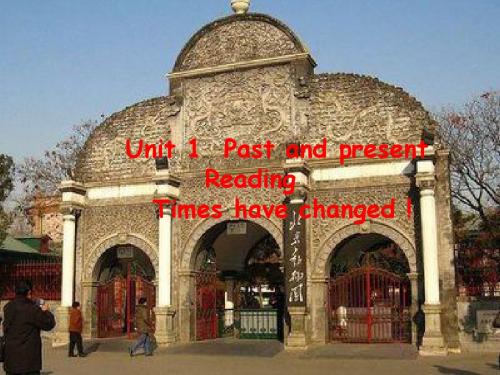
Picture show
Let’s enjoy pictures of Beijing first. Witness great changes of Beijing!
market stall
Exercises
事实上
结婚 搬出 变了许多 中国象棋 市场售货摊 在过去
翻译下列短语
in fact get married move out of change a lot Chinese chess market stall in the past
Exercises
变成
翻译下列短语
turn into play cards Reduce pollution Chinese medicine shop from time to time
4. Nanjing has _________ changed a lot since 2000.
5. My cousin is no longer a student. He has __________ become an office worker now.
Thank you!
Deep reading
Read the dialogue again and answer the following questions about Sunshine Town
1.What’s the reason of the pollution?
2.Does Mr. Dong feel a bit lonely? Why? 1.There were once a steel factory near the Sunshine River. 2.Yes. Because his old friends have moved away.
牛津译林版八年级英语下册Unit1知识点归纳总结

1. past and present 过去和现在past 1). n. in the past(一般过去时)2). adj. in the past few years(现在完成时) 3). prep. walk past 经过=present 1). n. 现在, 目前 at present 2). n. 礼物 receive a present 收到一件礼物 2. in the bowl 在碗里; on the plate 在盘子上 3. 1).过去常常做某事(现在不做了) usedto do sth. = often did sth. in the pastused to be…= … was/were once… = was/were… in the past 和某人分享某物 share sth. with sb.Eg. You often shared food with me in the past. = Youfood with me.You used to be so kind to me. = Youto me.2). 习惯于, 适应于(做)某事 be/get used to (doing) sth. (现在仍如此做)我习惯于上午六点起床。
Iup at 6 a.m.3). 区分:used to do sth. 过去常常做某事(现在不做)get/be used to doing sth. 习惯于做某事(to 为介词)4. just 1). adv. 刚才(现在完成时) I’v e just eaten it.2). adv. 正好, 恰好(加强语气) The shirt is just my size.这件衬衫正和我的尺码。
3). just now 刚刚, 刚才(一般过去时);5. change 1). v./n. 改变, 变化 changes in/to … ……的变化 T h etown has changed a lot over the years.(v.)= There have been great changes over the years. (n.)= Great changes have taken place over the years.2). n. [U] 零钱. Here is your change. 这是你的零钱。
牛津译林版八年级英语下册8Bunit1 past and present 课文要点全解
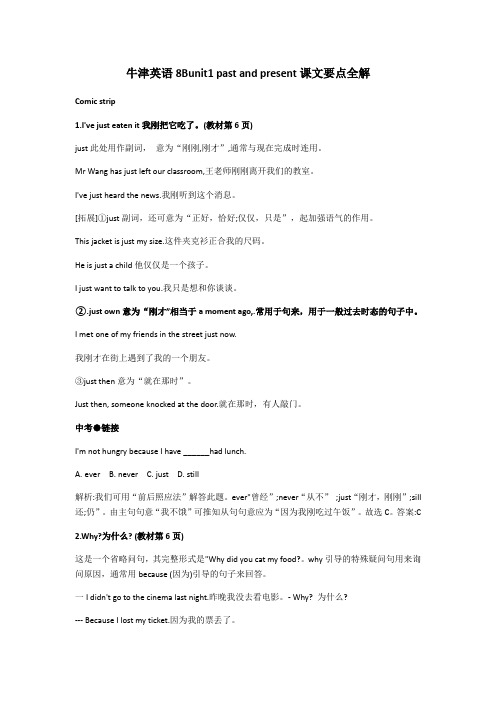
牛津英语8Bunit1 past and present课文要点全解Comic strip1.I've just eaten it我刚把它吃了。
(教材第6页)just此处用作副词,意为“刚刚,刚才”,通常与现在完成时连用。
Mr Wang has just left our classroom,王老师刚刚离开我们的教室。
I've just heard the news.我刚听到这个消息。
[拓展]①just副词,还可意为“正好,恰好;仅仅,只是”,起加强语气的作用。
This jacket is just my size.这件夹克衫正合我的尺码。
He is just a child他仅仅是一个孩子。
I just want to talk to you.我只是想和你谈谈。
②.just own意为“刚才”相当于a moment ago,.常用于句来,用于一般过去时态的句子中。
I met one of my friends in the street just now.我刚才在街上遇到了我的一个朋友。
③just then意为“就在那时”。
Just then, someone knocked at the door.就在那时,有人敲门。
中考●链接I'm not hungry because I have ______had lunch.A.everB. neverC. justD. still解析:我们可用“前后照应法”解答此题。
ever"曾经”;never“从不”;just“刚才,刚刚”;sill 还;仍”。
由主句句意“我不饿”可推知从句句意应为“因为我刚吃过午饭”。
故选C。
答案:C2.Why?为什么? (教材第6页)这是一个省略问句,其完整形式是"Why did you cat my food?。
why引导的特殊疑问句用来询问原因,通常用because (因为)引导的句子来回答。
牛津译林版英语八下Unit 1《Past and Present》(Task)教学设计

牛津译林版英语八下Unit 1《Past and Present》(Task)教学设计一. 教材分析牛津译林版英语八下Unit 1《Past and Present》主要介绍了人们的生活在过去和现在是如何变化的。
通过对比过去和现在的生活,让学生学会使用过去时和现在时描述事物的变化。
本课时的Task部分主要让学生学会如何根据自己的需求选择合适的住房。
本节课的主要话题是房屋租赁和购买,学生需要掌握相关的词汇和句型,以及学会如何进行房屋租赁和购买的对话。
二. 学情分析学生在学习本节课之前,已经掌握了如何描述过去和现在的生活的语法知识,同时也具备了一定的房屋租赁和购买的相关词汇。
但是,学生对于如何在实际场景中运用这些知识和词汇进行对话还存在一定的困难。
因此,在教学过程中,教师需要帮助学生将这些知识和词汇应用到实际场景中,提高学生的实际语言运用能力。
三. 教学目标1.知识目标:–学生能够掌握并运用相关的词汇和句型描述房屋租赁和购买的情况。
–学生能够通过对比过去和现在的生活,学会使用过去时和现在时描述事物的变化。
2.能力目标:–学生能够在实际场景中运用所学的知识和词汇进行对话。
–学生能够提高自己的听、说、读、写的能力。
3.情感目标:–学生能够通过学习本节课,增强对英语学习的兴趣。
–学生能够学会如何根据自己的需求选择合适的住房。
四. 教学重难点•学生能够掌握并运用相关的词汇和句型描述房屋租赁和购买的情况。
•学生能够通过对比过去和现在的生活,学会使用过去时和现在时描述事物的变化。
•学生能够在实际场景中运用所学的知识和词汇进行对话。
•学生能够学会如何根据自己的需求选择合适的住房。
五. 教学方法1.情境教学法:通过设定真实的房屋租赁和购买的场景,让学生在实际情境中学习并运用所学的知识和词汇。
2.任务型教学法:通过完成具体的任务,让学生学会如何根据自己的需求选择合适的住房。
3.交际法:通过小组讨论和角色扮演等方式,让学生在课堂上进行真实的交际,提高学生的听、说、读、写的能力。
牛津译林初中八年级下册英语Unit 1 Past and Present Integrated

Task3: Finish the exercises in A3.
Kitty is writing about Starlight Town in her diary. Complete her diary entry on the next page with the words in the box.
air bicycle birds buildings flats
hills houses modern railway taxi
Complete Kitty’s diary
13 February
Dear Diary,
Today, I borrowed a book about Starlight Town’s past and present. Starlight Town was very beautiful years ago. There were green _h_il_l_s___ and wild _b_i_rd_s___ near the lake. The __ai_r____ was clean and fresh then.和过去分词:
be
was/were been
give
gave
given
see
saw
seen
make made
made
put
put
put
come
came
come
write
wrote
written
动 词 填 空:
1._H_a_v_e_ you _c_l_e_a_n__e_d(clean) the room?
5. Sheh_a__s_g_o__n_e_(go) to Pairs, hasn’t she? Yes. How _d_i_d___ she _g__o____(go) there?
牛津译林版 8B八年级下册 Unit1 Past and present 知识点梳理
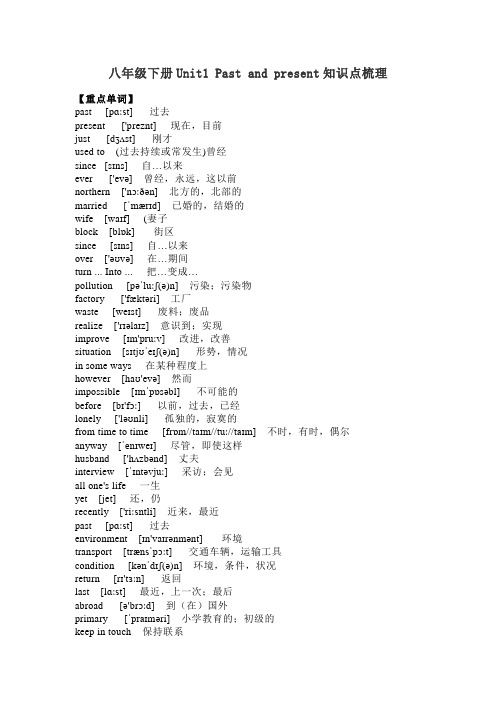
八年级下册Unit1 Past and present知识点梳理【重点单词】past [pɑːst]过去present ['preznt] 现在,目前just [dʒʌst] 刚才used to (过去持续或常发生)曾经since [sɪns] 自…以来ever ['evə] 曾经,永远,这以前northern ['nɔːðən] 北方的,北部的married [ˈmærɪd] 已婚的,结婚的wife [waɪf] (妻子block [blɒk] 街区since [sɪns] 自…以来over ['əʊvə] 在…期间turn ... Into ... 把…变成…pollution [pəˈluːʃ(ə)n] 污染;污染物factory ['fæktəri] 工厂waste [weɪst] 废料;废品realize ['rɪəlaɪz] 意识到;实现improve [ɪm'pruːv]改进,改善situation [sɪtjʊˈeɪʃ(ə)n] 形势,情况in some ways 在某种程度上however [haʊ'evə] 然而impossible [ɪmˈpɒsəbl] 不可能的before [bɪ'fɔː]以前,过去,已经lonely ['ləʊnli] 孤独的,寂寞的from time to time [frɒm//taɪm//tuː//taɪm] 不时,有时,偶尔anyway [ˈenɪweɪ] 尽管,即使这样husband ['hʌzbənd] 丈夫interview [ˈɪntəvjuː]采访;会见all one's life 一生yet [jet] 还,仍recently ['riːsntli]近来,最近past [pɑːst]过去environment [ɪn'vaɪrənmənt] 环境transport [trænsˈpɔːt]交通车辆,运输工具condition [kənˈdɪʃ(ə)n] 环境,条件,状况return [rɪ'tɜːn]返回last [lɑːst]最近,上一次;最后abroad [ə'brɔːd]到(在)国外primary [ˈpraɪməri] 小学教育的;初级的keep in touch 保持联系communicate [kəˈmjuːnɪkeɪt] 交流,交际communication [kəmjuːnɪˈkeɪʃ(ə)n] 交流,交际exactly [ɪg'zæktli] (答语)正是,没错be/get used to 习惯于,适应于narrow [ˈnærəʊ] 狭窄的open space 开阔的空地【重点词组】1.in the bowl an hour ago一个小时之前在碗里的ed to do sth.过去常常做某事be used to doing sth. 习惯于做某事be used to do sth. 被用来做某事3.do a history project on the changes in Beijing over the years做个有关这些年北京的变化的历史调查4.write a report on the changes in your home town 写一个有关你家乡的变化的报道5.know about the different forms of transport 对不同形式的交通工具很了解6.talk about transport at different times 讨论不同时期的交通工具7.take turns to do sth.=do sth. by turns 轮流做某事8.go to school by bike = ride a bike to school 骑自行车去学校9.wait for the next one 等下一辆车10.go to school by bus= take a bus to school= go to school on the bus乘公交车去学校11.interview sb. to get some information 为了得到些信息采访某人12.know sunshine town very well 对阳光镇很了解13.be born 出生14.move house 搬家15.in the northern part of town 在这个镇的西部16.get married to sb.= marry sb.= be married to sb.和某人结婚17.marry sb. to sb. 把某人嫁给某人18.move two blocks away搬到两个街区以外19.live in this area 住在这个地区20.since then 自从那以后since I was born/ since last Saturday/since three days ago21.over the years 这些年over the past century 在过去的几个世纪22.in the town centre= in the centre of the town 在镇中心23.turn/change/put sth. into 把某物变成某物24.a steel factory 一个钢铁厂25.put the waste into the river 把垃圾倒入河里put down 记下put away 收好put on 穿上put off 推迟、延期26.take action to improve the situation采取行动改善这种情况27.in some ways 在某些方面on the way (to ) 在……的路上by the way 顺便说no way 没门in any way 无论如何28.most of my old friends大部分我的老朋友29.move away 搬走/move to(into) another town30.see each other as often as before像以前一样经常看到对方31.play cards and Chinese chess 打牌和下棋32.feel a bit lonely 感到有点孤单33.from time to time = at times = sometimes 有时34.because of being alone 因为独自一人35.a group of buildings with streets on all sides街道两边全是高楼on both sides/ on each side36.interview sb.= have an interview with sb. 采访某人37.all his life 整个他的一生38.in the past 在过去at present 现在39.make some notes 做些笔记40.waste sth. on sth./ sb.浪费某物在某物/某人上41.repair over ten bicycles= repair more than ten bicycles修理超过10辆自行车42.teach sb. a lot about the history of China教我很多有关中国的历史43.talk about a film about the history of Beijing讨论一个有关北京历史的影片44.learn more about Beijing’s past and present对北京的过去和现在了解更多45.hear about/of 听说hear from sb.= receive/ get one’s letter=receive/get a letter of sb.收到某人来信46.living conditions 居住条件47.return sth. to sb. 把某物归还给某人48.go abroad 去国外at home or abroad 在国内外49.at primary school 在小学50.keep in touch with each other 互相保持联系51.make communication much easier使得联系更容易Communicate with sb.和某人保持联系52.take place发生(有目的有计划的)、举行happen发生(偶然发生)53.green hills all around到处都是绿山54.a river runs through the centre of town一条小河穿过镇中心55.get used to the changes of life习惯了生活的变化56.on one’s own = by oneself = alone独自57.throw rubbish 扔垃圾58.in some large open spaces在一些大的开阔的地方59.move into new flats搬到新公寓去60.in their free time在他们业余时间61.travel around the town在镇里转转62.have their own cars= have cars of their own有他们自己的汽车e the new words to talk about my hometown用些新词来讨论我的家乡e facts to support my opinions用事实来支持我的观点【重点句型】1.There were always too many people on the bus, and it took a long time to wait for the next one.公共汽车上总是有太多的人,并且要花费很长时间等待下一趟。
牛津译林版八年级下册Unit1《PastandPresent》说课稿
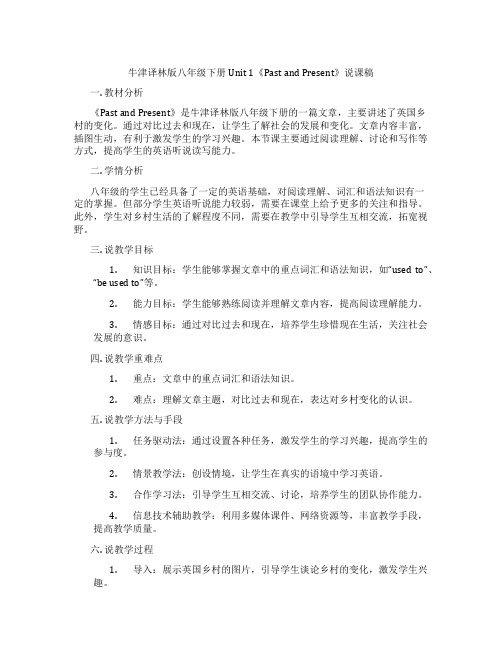
牛津译林版八年级下册Unit 1《Past and Present》说课稿一. 教材分析《Past and Present》是牛津译林版八年级下册的一篇文章,主要讲述了英国乡村的变化。
通过对比过去和现在,让学生了解社会的发展和变化。
文章内容丰富,插图生动,有利于激发学生的学习兴趣。
本节课主要通过阅读理解、讨论和写作等方式,提高学生的英语听说读写能力。
二. 学情分析八年级的学生已经具备了一定的英语基础,对阅读理解、词汇和语法知识有一定的掌握。
但部分学生英语听说能力较弱,需要在课堂上给予更多的关注和指导。
此外,学生对乡村生活的了解程度不同,需要在教学中引导学生互相交流,拓宽视野。
三. 说教学目标1.知识目标:学生能够掌握文章中的重点词汇和语法知识,如“used to”、“be used to”等。
2.能力目标:学生能够熟练阅读并理解文章内容,提高阅读理解能力。
3.情感目标:通过对比过去和现在,培养学生珍惜现在生活,关注社会发展的意识。
四. 说教学重难点1.重点:文章中的重点词汇和语法知识。
2.难点:理解文章主题,对比过去和现在,表达对乡村变化的认识。
五. 说教学方法与手段1.任务驱动法:通过设置各种任务,激发学生的学习兴趣,提高学生的参与度。
2.情景教学法:创设情境,让学生在真实的语境中学习英语。
3.合作学习法:引导学生互相交流、讨论,培养学生的团队协作能力。
4.信息技术辅助教学:利用多媒体课件、网络资源等,丰富教学手段,提高教学质量。
六. 说教学过程1.导入:展示英国乡村的图片,引导学生谈论乡村的变化,激发学生兴趣。
2.阅读理解:学生自主阅读文章,回答相关问题,检测学生对文章内容的理解。
3.词汇语法:讲解文章中的重点词汇和语法知识,如“used to”、“beused to”等。
4.讨论:分组讨论乡村的变化,引导学生发表自己的观点。
5.写作:以“My Hometown”为主题,让学生写一篇短文,描述家乡的变化。
牛津译林版英语八下Unit1《PastandPresent》(Welcome)说课稿
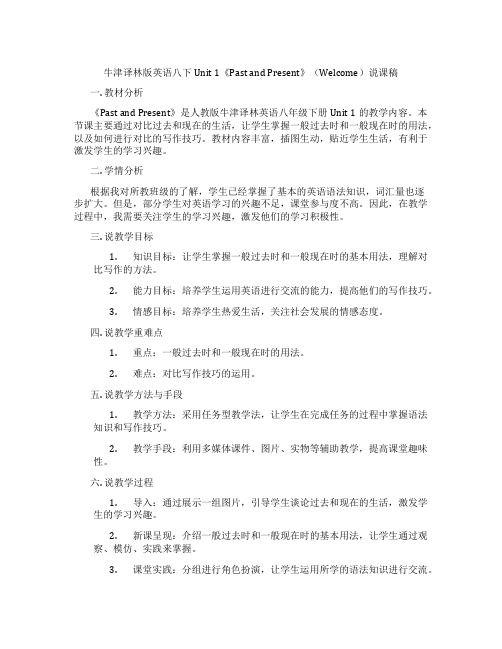
牛津译林版英语八下Unit 1《Past and Present》(Welcome)说课稿一. 教材分析《Past and Present》是人教版牛津译林英语八年级下册Unit 1的教学内容。
本节课主要通过对比过去和现在的生活,让学生掌握一般过去时和一般现在时的用法,以及如何进行对比的写作技巧。
教材内容丰富,插图生动,贴近学生生活,有利于激发学生的学习兴趣。
二. 学情分析根据我对所教班级的了解,学生已经掌握了基本的英语语法知识,词汇量也逐步扩大。
但是,部分学生对英语学习的兴趣不足,课堂参与度不高。
因此,在教学过程中,我需要关注学生的学习兴趣,激发他们的学习积极性。
三. 说教学目标1.知识目标:让学生掌握一般过去时和一般现在时的基本用法,理解对比写作的方法。
2.能力目标:培养学生运用英语进行交流的能力,提高他们的写作技巧。
3.情感目标:培养学生热爱生活,关注社会发展的情感态度。
四. 说教学重难点1.重点:一般过去时和一般现在时的用法。
2.难点:对比写作技巧的运用。
五. 说教学方法与手段1.教学方法:采用任务型教学法,让学生在完成任务的过程中掌握语法知识和写作技巧。
2.教学手段:利用多媒体课件、图片、实物等辅助教学,提高课堂趣味性。
六. 说教学过程1.导入:通过展示一组图片,引导学生谈论过去和现在的生活,激发学生的学习兴趣。
2.新课呈现:介绍一般过去时和一般现在时的基本用法,让学生通过观察、模仿、实践来掌握。
3.课堂实践:分组进行角色扮演,让学生运用所学的语法知识进行交流。
4.写作环节:以对比过去和现在的生活为主题,让学生进行写作练习。
5.展示评价:选取部分学生的作品进行展示,让大家共同欣赏、评价。
6.总结:对本节课所学内容进行总结,强调对比写作的技巧。
七. 说板书设计板书设计如下:过去时 vs 现在时•构成:一般过去时(动词过去式)+ 主语 + 动词过去式 + 其他;一般现在时(动词原形)+ 主语 + 动词原形 + 其他•用法:描述过去发生的事情;描述现在经常发生的事情•对比写作:找出过去和现在的不同点,进行对比阐述八. 说教学评价1.课堂参与度:观察学生在课堂上的发言、互动情况,了解他们的学习积极性。
2020春牛津译林版英语八下Unit1PastandPresentword重点词组句型及语法
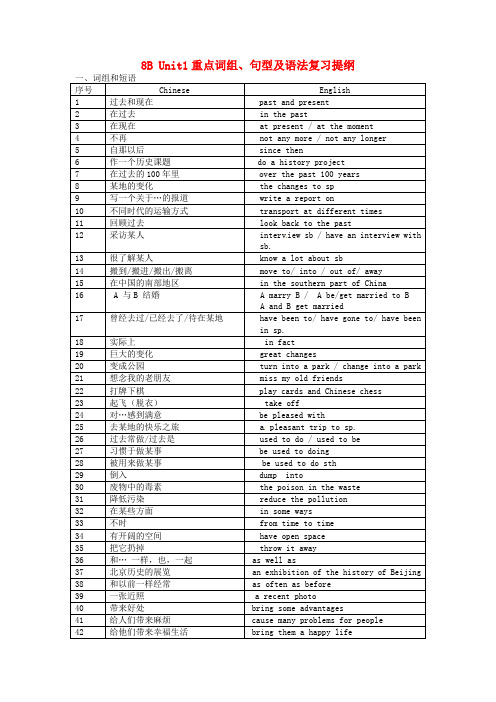
8B Unit1重点词组、句型及语法复习提纲序号Chinese English1 过去和现在past and present2 在过去in the past3 在现在at present / at the moment4 不再not any more / not any longer5 自那以后since then6 作一个历史课题do a history project7 在过去的100年里over the past 100 years8 某地的变化the changes to sp9 写一个关于…的报道write a report on10 不同时代的运输方式transport at different times11 回顾过去look back to the past12 采访某人interv iew sb / have an interview withsb.13 很了解某人know a lot about sb14 搬到/搬进/搬出/搬离move to/ into / out of/ away15 在中国的南部地区in the southern part of China16 A 与B 结婚 A marry B / A be/get married to BA andB get married17 曾经去过/已经去了/待在某地have been to/ have gone to/ have beenin sp.18 实际上in fact19 巨大的变化great changes20 变成公园turn into a park / change into a park21 想念我的老朋友miss my old friends22 打牌下棋play cards and Chinese chess23 起飞(脱衣)take off24 对…感到满意be pleased with25 去某地的快乐之旅a pleasant trip to sp.26 过去常做/过去是used to do / used to be27 习惯于做某事be used to doing28 被用来做某事be used to do sth29 倒入dump into30 废物中的毒素the poison in the waste31 降低污染reduce the pollution32 在某些方面in some ways33 不时from time to time34 有开阔的空间have open space35 把它扔掉throw it away36 和…一样,也,一起as well as37 北京历史的展览an exhibition of the history of Beijing38 和以前一样经常as often as before39 一张近照 a recent photo40 带来好处bring some advantages41 给人们带来麻烦cause many problems for people42 给他们带来幸福生活bring them a happy life43 一个新的旅游胜地 a new tourist attraction44 想起think of45 确保做某事be sure to do46 远离be far from47 一点也不n ot… a bit48 非常n ot…a little49 周围的青山绿水green hills and rivers around50 把某物落在某地leave sth sp51 和某人一起拍照take photos with sb52 拍某人的照片take photos of sb53 处于使用中be in service / be in use54 乘…去某地take … to sp /go to sp by….55 靠近next to56 更少的发展less development57 放学后在学校和朋友聊天stay after school to chat with friends58 同意某人的观点agree with sb59 同意做某事agree to do60 有更多的时间放松自己have more time to relax oneself61 在小学in primary school62 有同感have the same feeling63 自然美景natural beauty64 顺便问一下by the way二、重点句子及句型:1. ----Eddie,have you seen my food ? ----Yes. I’ve just eaten it.factory used to dump its waste into the river.(didn’t use to do/used not to do)have known the place since I was very young.lived together till 1965 when I got married.5.China has changed a lot. = Great changes have happened to China.= There have been gr eat changes in China.of them have moved to other areas and I feel a bit lonely from time to time.cannot see their friends as often as before.government realized it was a very serious problem and took action to reduce the pollution.has lived with Millie since he was born./last year/3years a go.have gone to the cinema already. John has been to the USA a few times. come to school by bus on my ownthinks he is unlucky enough to see the changes to Sunshine Town.will stay there for a whole week to enjoy the sun and the beach.wish you a happy holiday. = I wish you will have a happy holiday.changes to Moonlight Town have brought many benefits but they have also caused many problems for people.16. Some animals and plants have lost their living areas because of these change s.17. It no longer provides a good environment for wildlife. = It does n’t providea good environment for wildlife any longer., let me show you how to get to the train station.三、语法:1.现在完成时用法一:表示过去发生的动作对现在产生影响。
牛津译林版八年级英语下册Unit1单元知识点讲解

牛津译林版8BU1 Past and present 知识点讲解 Teachingobjectives1.知识目标:掌握第一单元的单词和短语2.技能目标:能够理解篇章,解决篇章问题3.情感目标:学生能够学会用语言描述过去发生的事件 Key points,Difficult points 1.重点单词用法 2.篇章阅读技巧ic strip考点1 You've changed , Eddie.埃迪,你变了。
【知识讲解】change 此处用作不及物动词,意为“变化”。
此外,changes 还可以作及物动词词组:change A into B 意为“把A 变成B”。
_______________________ turn A into B1.In England, the weather changes very often.在英格兰,天气时常变化。
2.The government changed the place into a beautiful park last year.去年政府将这个地方变成了一个漂亮的公园。
3.Now the government has turned part of the town centre into a new park.现在政府已把城镇中心的部分改建成了一个新公园。
(教材第8页)4.The farmers are trying to turn wastelands into rice fields.农民们正努力把荒地变为稻田。
【例题详解】 1.(2023下·江苏常州·八年级校考阶段练习)The country life he was used to (change) greatly since 1992.2.(2023下·江苏泰州·八年级统考阶段练习)With the development of China, the life we were used to (change) greatly in the recent years.3.(2023下·江苏泰州·八年级统考阶段练习)There (be) great changes to this place over the past 10 years.4.(2016上·江苏扬州·八年级统考期中)I’m looking forward to __________(share) my joy with you.5.(2018下·八年级单元测试)Well, that’s another way I could think of ________ (share) the same idea with them.考点2. You used to share food with me!你过去常常与我分着吃食物的!【知识讲解】(1)used to 意为“曾经,过去常常”,暗含“现在不再”之意,后接动词原形。
2023年牛津译林版八年级英语下册《8B Unit 1 Past and present》教案:St

《8B Unit 1 Past and present》教案:Study skillsTeaching aims:1.To understand the difference between facts and opinions.2.To learn the ways to express opinions.3.To learn to state facts an d ex press opinions.Important points:1.To understand the difference between facts and opi nions.2.To learn the way s to express opinionsDifficult point:To learn to state facts and express opinions.Teaching procedures:Step 1 Lead-in1. Do you still remember Starlight Town? It has changed a lot. What has changed in the environment, the transport and the living conditions?2. Then what do you think of Starlight Town? And why? Write down some of the answers, e.g. I think Starlight Town is a modern town. It has tall buildings and a new railway station. Te ll S s that the first sentence is an opinion, and the s econd one is a fact. Do you know what fact and opinion mean?3. Facts are true s tatements. They include names, dates, events and numbers. Opinions tell what we believe, feel or think. When people say something beginning with I think, I believe or I feel, or using adjectives like good, bad, and terrible, that must be their opinion.Step 2 Presentation1. Ask Ss to open their books and turn to page 17. Then ask then to look at more examples.2. Tell Ss: When we write, we can use facts to support our opinions. We can also give facts first, and then state our opinions. For example: “My hometown is beautiful.” This is an opinion. “ There are green hills all around. A river runs through the centre of town.”This is a fact.Step 3 Practice。
2023年牛津译林版八年级英语下册《Unit 1 Past and present》(Period

《Unit 1 Past and present》(Period 4)导学案【学习目标】1. 识记动词的过去分词形式。
2. 学习在语境中正确运用现在完成时。
3. 运用现在完成时谈论发生在过去并与现在有联系的事情。
【导学提纲】A. 你能翻译课文中的这些词组吗?快来试一试吧!1. 没有东西吃2. 许多次3. 完成他们的家庭作业4. 参观中国5. 修理十多辆自行车______________________6. 彼此见面7. 回来,返程8. 中国的历史9. 北京的变化10. 在过去的一个世纪里11.获知许多关于北京的过去与现在的情况______________________________________________12. 听说这部电影13.计划再看一次这个展览_______________________B. 写出本单元学过的3个现在完成时的句子,思考现在完成时如何构成。
1. _______________________________________________________________2. _______________________________________________________________3. _______________________________________________________________【展示交流】1. 小组检查单词的拼写和读音,纠正错误。
2. 小组检查归纳的3个现在完成时的句子,纠正错误。
3. 小组归纳总结现在完成时的用法和构成。
4. 小组总结动词过去分词的构成。
【个案补充】_____________________________________________________________________________________ _______________________________________________________________________________【盘点收获】现在完成时的时间表达词及用法1. already 肯定句,表示已经发生的事2. ever 疑问句,表示“曾经”3. for 肯定句/否定句/疑问句, 表示一段时间4. just 肯定句,表示“刚刚”5. never 否定句,表示“从不”6. since肯定句/否定句/疑问句, 表示“自……以来”7. yet疑问句/否定句,表示“还没有”8. recently肯定句/否定句/疑问句, 表示“最近”【反馈矫正】一、词汇根据提示写出单词,完成句子。
Unit+1+Past+and+present知识点整理 牛津译林版英语八年级下册
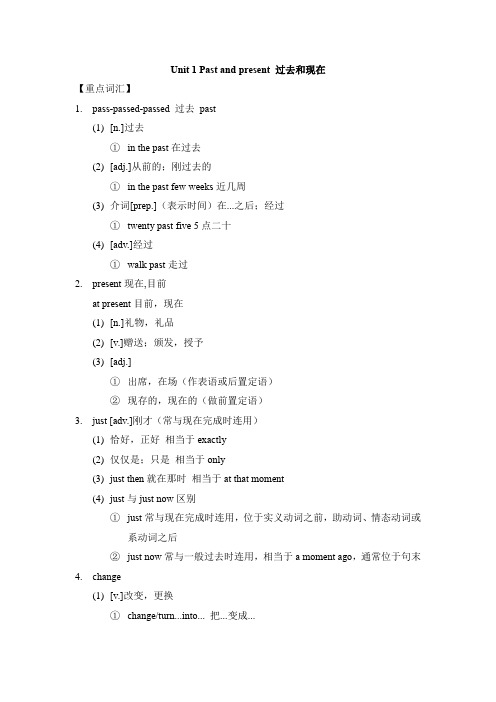
Unit 1 Past and present 过去和现在【重点词汇】1.pass-passed-passed 过去past(1)[n.]过去①in the past在过去(2)[adj.]从前的;刚过去的①in the past few weeks近几周(3)介词[prep.](表示时间)在...之后;经过①twenty past five 5点二十(4)[adv.]经过①walk past走过2.present现在,目前at present目前,现在(1)[n.]礼物,礼品(2)[v.]赠送;颁发,授予(3)[adj.]①出席,在场(作表语或后置定语)②现存的,现在的(做前置定语)3.just [adv.]刚才(常与现在完成时连用)(1)恰好,正好相当于exactly(2)仅仅是;只是相当于only(3)just then就在那时相当于at that moment(4)just与just now区别①just常与现在完成时连用,位于实义动词之前,助动词、情态动词或系动词之后②just now常与一般过去时连用,相当于a moment ago,通常位于句末4.change(1)[v.]改变,更换①change/turn...into... 把...变成...(2)[n.]变化,变革;零钱(不可数名词)5.since[conj.]&[prep.]自……以来6.ever[adv.]曾经7.northern北方的,北部的southern western eastern8.married已婚的,结婚的(1)get married结婚(2)be married已婚(3)be/get married to sb.与某人结婚9.wife妻子-wives[pl.](1)knife-knives(2)wolf-wolves(3)thief-thieves(4)half-halves(5)leaf-leaves10.away[adv.]离开,在(某距离)处(1)go away离开(2)right away立刻(3)take away带走(4)run away逃离(5)put away收起来(6)far away远离(7)keep...away from... 使...远离...11.block街区12.pollution污染;污染物(1)[v.]pollute(2)light pollution光污染(3)air pollution空气污染(4)water pollution水污染(5)noise pollution噪声污染13.problem[n.]问题,难题(1)question与ask/answer(2)problem难以解决问题solve/work out连用14.factory工厂15.waste(1)废料;废品(不可数名词)(2)[n.]浪费,可以和冠词a连用(3)[adj.]废弃的,无用的;荒芜的(4)[v.][新义]浪费,滥用①waste sth. on sth.浪费某物在某物/事上②waste sth. (in) doing sth.浪费某物做某事16.realize[v.]意识到;实现(1)realize实现,是及物动词,被实现(2)come true实现,成为现实,是不及物动词,不能用于被动语态17.situation形势,情况18.husband丈夫19.impossible[adj.]不可能的(1)impossibly[adv.](2)possible[adj.]-possibly[adv.](3)possibility[n.]可能性20.interview采访;会见[新义]n.对……进行面试;采访21.environment环境condition环境,条件,状况22.lonely和alone(1)lonely形容词孤独的,强调人的内心感受;偏僻的。
牛津译林版英语八下Unit 1《Past and Present》(Reading 1)说课稿

牛津译林版英语八下Unit 1《Past and Present》(Reading 1)说课稿一. 教材分析《Past and Present》是人教版牛津译林英语八年级下册的第一单元阅读篇目,主要讲述了一位叫Li Ming的学生介绍他家乡的变化。
文章通过对比过去和现在,让学生了解社会的发展和变化。
本篇文章题材贴近学生生活,有助于激发学生的学习兴趣,同时培养学生的阅读理解和信息获取能力。
二. 学情分析八年级的学生已经具备一定的英语基础,对于日常生活中的词汇和简单语法结构有所了解。
但学生在阅读长篇阅读材料时,可能会遇到生词和复杂句子结构的理解困难。
因此,在教学过程中,教师需要帮助学生克服这些困难,提高他们的阅读理解能力。
三. 说教学目标1.知识目标:学生能掌握文章中的关键词汇和短语,如“remember,”“used to,” “now,” “develop,” “modernize,” 等。
2.能力目标:学生能够理解文章的主旨大意,把握文章的脉络结构,提高阅读理解能力。
3.情感目标:通过对比过去和现在,让学生认识到社会的发展和变化,培养学生的社会责任感和使命感。
四. 说教学重难点1.重点:学生能熟练运用文章中的关键词汇和短语,理解文章的主旨大意。
2.难点:学生能分析文章的脉络结构,把握文章的写作手法,提高阅读理解能力。
五. 说教学方法与手段1.教学方法:采用任务型教学法,让学生在完成任务的过程中,提高阅读理解能力。
2.教学手段:利用多媒体课件、图片、视频等辅助教学,激发学生的学习兴趣,提高课堂效果。
六. 说教学过程1.导入:教师通过展示一张中国乡村的图片,引导学生思考:你能描述一下这张图片吗?它发生了什么变化?以此引出本课的主题。
2.阅读理解:学生自主阅读文章,完成相关练习题,教师引导学生讨论答案,解答疑问。
3.精讲环节:教师针对文章中的重点词汇和短语进行讲解,让学生掌握正确的用法。
4.拓展环节:学生分组讨论,对比自己家乡的变化,并用英语进行表述。
牛津译林版八年级下册unit1教案

牛津译林版八年级下册unit1教案一、教学内容本节课选自牛津译林版八年级下册Unit 1《Past and present》,涉及章节13。
内容包括:了解和描述过去与现在的变化,运用一般过去时和现在完成时进行表达;学会使用频率副词谈论过去和现在的活动。
二、教学目标1. 能够听懂、会说、会读、会写本节课所学的单词和短语,如:home, used to, population, factory, so far等。
2. 能够运用一般过去时和现在完成时描述过去和现在的变化。
3. 能够通过小组合作,用英语进行交流,探讨家乡的变化。
三、教学难点与重点1. 教学难点:一般过去时和现在完成时的区别及运用。
2. 教学重点:掌握本节课的词汇和短语,以及运用这两种时态描述过去和现在的变化。
四、教具与学具准备1. 教具:多媒体设备、PPT、黑板、录音机等。
2. 学具:课本、练习册、笔记本、字典等。
五、教学过程1. 导入:通过展示一组家乡过去和现在的照片,引导学生谈论家乡的变化,激发学生的学习兴趣。
2. 新课内容展示:a. 学习词汇和短语,结合图片进行展示和讲解。
b. 通过听力练习,让学生感知一般过去时和现在完成时的区别。
c. 引导学生运用这两种时态进行句子练习,巩固语法知识。
3. 例题讲解:结合教材,讲解一般过去时和现在完成时的用法,并进行例句展示。
4. 随堂练习:设计相关练习题,让学生进行口头和书面练习,巩固所学知识。
5. 小组活动:分组讨论,让学生用英语谈论自己家乡的变化,并进行汇报。
六、板书设计1. Unit 1 Past and present2. 主要内容:a. 新单词和短语:home, used to, population, factory,so far等。
b. 语法点:一般过去时和现在完成时的区别及运用。
七、作业设计1. 书面作业:完成练习册上的相关练习题。
2. 口头作业:用英语与家人或朋友谈论家乡的变化。
[初二英语]英语Unit 1 Past and present重点语法和句型(译林牛津八年级下)
![[初二英语]英语Unit 1 Past and present重点语法和句型(译林牛津八年级下)](https://img.taocdn.com/s3/m/f92237f0195f312b3169a560.png)
Unit 1 Past and present一. 教学内容:Unit 1 Past and presentwords, phrases and sentences二. 教学目标:掌握Unit 1的词汇及词性变化和课文中的重点词组、句型的结构和用法Unit 1 Past and present(一)基础词汇过去,往事past目前,现在present(n. 现在,通常与过去、将来相对应。
The past, the present and the future . 过去、现在和将来。
at present. 此刻、现在: I’m afraid I can’t help you just at present. ----- I’m too busy. 很抱歉,我现在帮不了你,----- 实在太忙了。
adj. 现在的。
the present day当今、现今。
Most young people enjoy listening to popular music the present day. )刚刚just(just, adv. 刚才。
常用于完成时态,在美式英语中用于一般过去时。
)I have just seen John. 我刚才见到约翰了。
I just saw him. (a moment ago). ( U. S)我(几分钟前)看到他的。
( U. S)自……以来since(since. 后面通常接点时间来表示一段时间。
例如:since 1984 自从1984年一直到现在。
since 3 days ago. 自从三天前一直到现在,也可以说成for 3 days 通常用how long提问。
How long has your uncle lived here? Since 1980. )南方的southern到……时till已婚的married(marry. vt. vi marry sb. 与某人结婚;嫁或娶某人。
牛津译林版八年级下册Unit 1 Past and Present教案3
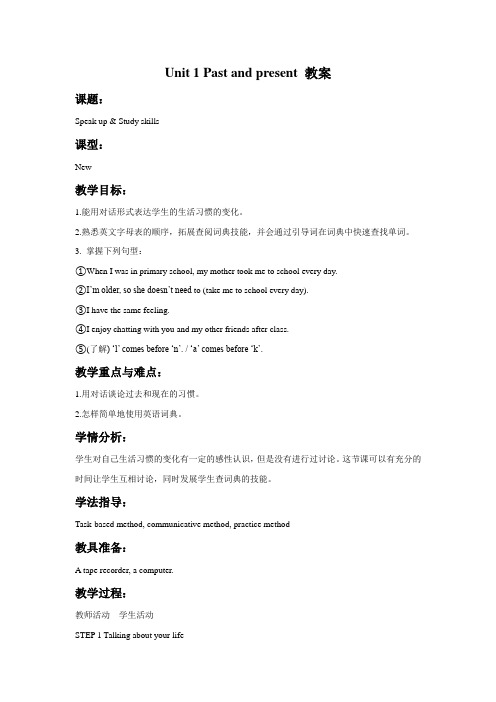
Unit 1 Past and present 教案课题:Speak up & Study skills课型:New教学目标:1.能用对话形式表达学生的生活习惯的变化。
2.熟悉英文字母表的顺序,拓展查阅词典技能,并会通过引导词在词典中快速查找单词。
3. 掌握下列句型:①When I was in primary school, my mother took me to school every day.②I’m older, so she doesn’t need to (take me to school every day).③I have the same feeling.④I enjoy chatting with you and my other friends after class.⑤(了解) ‘l’ comes before ‘n’. / ‘a’ comes before ‘k’.教学重点与难点:1.用对话谈论过去和现在的习惯。
2.怎样简单地使用英语词典。
学情分析:学生对自己生活习惯的变化有一定的感性认识,但是没有进行过讨论。
这节课可以有充分的时间让学生互相讨论,同时发展学生查词典的技能。
学法指导:Task-based method, communicative method, practice method教具准备:A tape recorder, a computer.教学过程:教师活动学生活动STEP 1 Talking about your lifeT: We know there have been great changes in Starlight Town over the years from the diary. Have there been changes in your life? Now you are in junior high school.You can go to school by bus or by bike. How did you go to school when you were in primary school?S1: My father took me to school every day.S2: My mother took me to school every day. Sometimes my grandfather took me to school.Use the following questions.(How do you ,/How did you,/What do you?).STEP 2 PresentationAsk some students where they were born.And ask the students who were born in other places where they were. They may give many other places. And what feeling do they have when they come back to their hometown. Some students will say there are many changes in their hometowns. Then the teacher tells them they are very surprised at the changes.STEP 3 Listen to the tapeExplain that Millie and Sandy are talking about the changes in their life. Listen to the tape and try to answer the questions. Ask the following questions.1) How did Millie go to school when she was in primary school?2) How does Millie go to school now? With the help of these questions, it will be easier for tudents to focus on the key information. They will also help them to organize their own dialogue. STEP 3 Read and actGet the students to read the dialogue on Page19 aloud. Pay special attention to the changes in their life. Then give the students several minutes for them to practice and act. Encourage them to remember the dialogue.Then let the students make a similar conversation in pairs. Work in pairs and find out about the changes in your partner’s life.STEP 4 Using a dictionaryWhen we do some reading, we often meet many new words. Ask the students what they will do when they meet new words. And tell them to look them up in an English dictionary is the best way to solve the questions. But how do you look up a new word in an English dictionary? Tell them how to use an English dictionary. First show a dictionary to the students, and tell the students theEnglish words in a dictionary are in alphabetical order from ‘A’ to ‘Z’. That is to say, the words which begin with ‘A’ are at the very beginning of a dictionary. And the words which begin with ‘B’ come after the words begin with ‘A’ and so on. If two words start with the same letter, we look at the second letter to decide the alphabetical rder. If the first two letters of two words are the same, we look at the third, and so on. Turn to Page 20. Complete Part A. Ask the students to put the following words in alphabetical order.STEP 5 Do some games.1.Give Ss some coded sentences. Tell them that in order to decode the message, they must replace each other letter with the letter that comes before it in the alphabet.2.Give Ss some coded sentences. Tell them that in order to decode the message, they must replace each other letter with the letter that comes afte it in the alphabet.。
